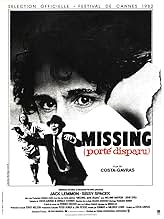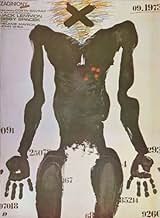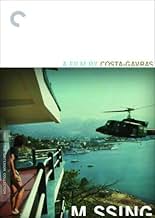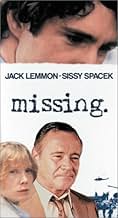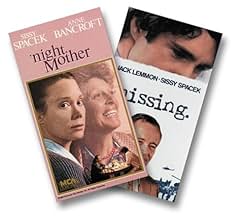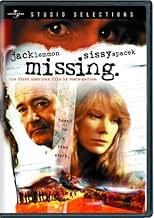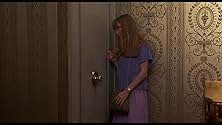Als ein idealistischer amerikanischer Schriftsteller während des chilenischen Staatsstreichs im September 1973 verschwindet, versuchen seine Frau und sein Vater, ihn zu finden.Als ein idealistischer amerikanischer Schriftsteller während des chilenischen Staatsstreichs im September 1973 verschwindet, versuchen seine Frau und sein Vater, ihn zu finden.Als ein idealistischer amerikanischer Schriftsteller während des chilenischen Staatsstreichs im September 1973 verschwindet, versuchen seine Frau und sein Vater, ihn zu finden.
- 1 Oscar gewonnen
- 12 Gewinne & 23 Nominierungen insgesamt
- Paris
- (as Martin Lasalle)
Empfohlene Bewertungen
This film won an Oscar for Best Screenplay. It was also nominated for Best Actor (Jack Lemmon), Best Actress (Sissy Spacek) and Best Picture. I am surprised that "Gandhi" won the Best Picture award that year--especially since the film was, in many ways, quite inaccurate historically (I am a history teacher--trust me on this one). "Missing" was a better film--as were "The Verdict", "Tootsie" and "ET" (in my semi-humble opinion). I wonder if perhaps the film's politics doomed it to lose--though considering Hollywood generally DOES run left, this may not be the case.
I am a reasonably conservative American, though I feel ashamed when I see films like "Missing" (as well as Costa-Garvas' other famous film, "Z"). While I am glad that the US had been traditionally anti-communist, this single-minded approach to international communism appears VERY misguided in hindsight. In too many cases, in order to combat this, the US government sponsored repressive and evil regimes--when they should have been pushing for self-determination and freedom. No matter how you try to excuse this, situations like the ones in "Missing" are simply inexcusable and the film should be seen by everyone--not just those on the left politically. Why? Because, the story in this case is TRUE--the situation involving the Pinochet regime in Chile was just plain evil--and should NOT be forgotten or ignored. History should be understood and lessons learned from them...or they'll be repeated. Well worth seeing and very well made overall.
Jack Lemmon gives another standout performance (in a career that had many) as the uptight father that learns to accept his son only after his suspected death. The emotional evolution from devout christian/disapproving dad to grieving father with 'opened eyes' is engaging to watch. Sissy Spacek shows the strength that should have won her a second oscar 2001 for "In The Bedroom" as the wife who never stops looking for her husband. But the clear winner in this politcal thriller is the director Costa Gravas, who constantly keeps the politcal tension high, without upstaging the performances of the leads.
A great drama that deal with life/death and the bond between parents and their children.
In his American works,while continuing his militant way,Costa-Gavras puts men and women made of flesh and blood on the screen:Jack Lemmon,who made us laugh so many times in Billy Wilder's masterpieces("some like it hot" "kiss me stupid" "the apartment",the highly underrated "Avanti"),shines in his dramatic part;his portrayal of an all-American man,proud of his country,who cannot really understand the evolution of the new generations but who knows that he's got only one son,whom he might never see again,is mind-boggling:his tired and sad face,always seeming on the verge of tears ,mainly in the second half of the movie which contains two classic scenes:
-The first one takes place in the stadium,where the prisoners are gathered;he's given a mike ,but a lump comes to his throat and he hands it to Sissi Spacek -who plays (with talent) the missing son's wife -;In the giant stadium,no echoes ,even when Lemmon,in a desperate call,asks his son to come home.
-The second one takes place in some kind of morgue,where dead bodies pile up.The wife and the father really go to hell,in this almost unbearable scene.
The Putsch (Costa-Gavras takes the American intervention for granted whereas there's nothing that proves it)takes a back seat to the desperate couple's plight.
Costa-Gavras has not completely forsaken France though:the book Spacek and Shea are reading is none other than Saint-Exupery's "le petit prince".
Govras chose as background for his film the actual diaries of Charles Horman, a lefty artist type who was living with his wife Beth in Chile. Horman had apparently picked up the unfortunate habit of inquiring into some dangerous affairs in a rather loud way. Isolated in every sense from any "live" political current, his disappearance and murder were relatively easy to accomplish, even though he was a United States citizen. The actor John Shea portrays Charles Horman as a naive sort, and there is no reason to assume this was an inaccurate depiction. Most citizens of the United States overseas are sheltered from the skulduggery of realpolitik, and most cling to some rather dangerous illusions about how far their rights as citizens actually extend. U.S. citizens in Lebanon who had to pay for their removal from that combat front last summer have learned this the hard way recently.
Jack Lemmon is stellar as Charles' father Ed Horman, who made the trip to Chile under the impression that he had rights his government felt bound to respect, and who discovered otherwise. And Cissy Spacek is never anything less than full marks as Beth Horman.
MISSING accomplishes what few political dramas do. It asks its viewer to consider the human dimensions and costs of an imperial political reality, and it portrays with a deadly earnestness what these ideas do to people caught up in the sway of such notions. There are no monsters in MISSING, just people who are doing their jobs and following orders. And therein lies the horror, one which all too many of our fellow citizens have yet to come to grips with. It is a rare feat among political films, an actual work of art. But don't be surprised if you need a stiff drink after viewing it. That's how I felt when I first saw this work after its release in 1982, and it still has that effect upon me today.
Wusstest du schon
- WissenswertesDuring the Pinochet dictatorship, which ran from 1973 to 1990, this picture was banned in Chile.
- PatzerWhen Ed Horman is at the State Department trying to get information about Charlie, there is the presidential portrait of Richard Nixon on the wall in the background and a more personal photo of him on Marine One on the credenza behind the desk. That photograph, with fingers in the V-peace sign, was taken upon his final departure from the White House in 1974 and could not have been on someone's desk in 1973.
- Zitate
Consul Phil Putnam: Please try to understand. There are so many cases. They're all so important, and this isn't the only one we're working on.
Ed Horman: It's the only one I care about.
Consul Phil Putnam: You and a lot of other people. Listen, I've never seen so many cables from Washington. What kind of pull do you have up there anyway?
Ed Horman: I'm an American citizen.
- SoundtracksMy Ding a Ling
(1952)
Written by Chuck Berry (uncredited)
Performed by Chuck Berry
Courtesy of All Platinum Records, Inc.
Top-Auswahl
Details
- Erscheinungsdatum
- Herkunftsländer
- Sprachen
- Auch bekannt als
- Desaparecido
- Drehorte
- Acapulco, Guerrero, Mexiko(as Vina del Mar)
- Produktionsfirmen
- Weitere beteiligte Unternehmen bei IMDbPro anzeigen
Box Office
- Budget
- 9.500.000 $ (geschätzt)
- Bruttoertrag in den USA und Kanada
- 14.000.000 $
- Weltweiter Bruttoertrag
- 14.000.000 $
- Laufzeit2 Stunden 2 Minuten
- Farbe
- Seitenverhältnis
- 1.85 : 1
Zu dieser Seite beitragen



